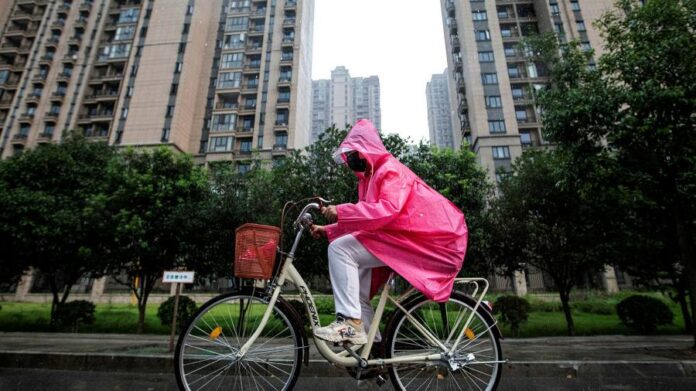Prices of newly constructed residential buildings in Wuhan have risen 6 per cent in the past year. But in October, there were signs of a more concerning trajectory taking hold in the central Chinese city.
A group of homebuyers protested last month after a developer cut prices by up to 30 per cent at a project where they had already made purchases. Several demonstrators were detained, state-backed media reported last week.
The issues in Wuhan are the latest sign that a crisis across the country’s real estate developers is putting pressure on house prices, heightening sensitivities around a property slowdown that already poses a threat to the wider Chinese economy.
Over recent years, authorities have introduced measures to control carefully price increases to avoid the risk of asset bubbles in a sector that accounts for the majority of household wealth.
But at a time when the overall real estate industry is contracting and a host of developers have already defaulted, officials in some regions are also acting to stop price moves in the other direction.
“Price controls are not just about price caps — local governments are also afraid of a sharp decline in price,” said Ting Lu, chief China economist at Nomura. “They want to prevent developers from cutting prices [and] competing against each other too aggressively.”
In Zhangjiakou, a mountainous city in Hebei province, prices had risen owing to its role hosting events at the Winter Olympics next year but have recently plummeted. In September, local authorities introduced rules citing “double stability” that prevented newly built homes being sold for less than 85 per cent of their original price.
Some other cities, including Yueyang and Guilin, have added similar measures. Officials in Shenyang called for “two-direction regulation”, which limits both excessive price rises and prices dropping too low, to promote the “healthy development of the real estate market”.
The Wuhan development, which according to the National Business Daily had been seen as one of the most sought-after in the area, highlights the risk that discounts at new projects pose to wider prices.
In China, where rapid urbanisation has resulted in hundreds of millions of people moving from the countryside into cities since the 1990s, official data focus on new rather than existing properties, in contrast to housing markets in the UK and the US.
Last year, according to Nomura, purchases of new homes amounted to Rmb15.5tn ($2.4tn), more than twice the Rmb7.3tn spent on purchases of existing homes.
Demand for new houses has spurred the growth but also the debts of China’s real estate developers, which have since last summer been under pressure from Beijing to reduce their leverage. A liquidity crisis at developer Evergrande and defaults at several of its peers have encouraged many of them to offer discounts on their properties as they rush to generate enough cash to sustain their business models.
Analysts at Citi argued last month that authorities were trying to “limit lower real estate prices due to fire sales by Evergrande by implementing price floors”. But they added that “price controls typically do not work” because “transactions dry up”.
Evergrande sold Rmb3.65bn of properties from the start of September to October 20 — less than 1 per cent of its total sales over 2021. On its official WeChat account last week, Evergrande said it had delivered 57,462 homes from July to the end of October.

For years, officials have sought to rein in market forces, usually through capping prices for newly built properties rather than attempting to tamper with prices in the secondary market. In many cities prices are still rising, despite rules designed to curtail them.
Louis Kuijs, head of Asia economics at Oxford Economics, suggested that policymakers in China view rapidly rising prices “as a symptom of a runaway housing market” and a cause of social unhappiness.
In the months leading up to the property slowdown, China increased measures to bring the market under control by not only limiting borrowing by developers but also constraining mortgage lending at banks.
In Shenzhen, measures were introduced that extended price guidance to existing rather than newly built homes, limiting mortgages relative to market prices. Similar rules were rolled out in other cities this year including Shanghai, Ningbo and Xi’an.
Shenzhen’s housing bureau said in an announcement in February that its efforts formed part of a drive to ensure houses were “for living in, not for speculating” — an echo of widely repeated comments from President Xi Jinping in 2017.
Even as new home prices across 70 of China’s biggest cities fell in September month on month for the first time since 2015, prices in most of them are still much higher than last year and there are few signs of the government relenting on its push to tame the market.
Lu noted that banks had been asked by Beijing to increase loans to developers, but added that the government “is likely to maintain most of its major property curbs until conditions become too challenging”.
But if stresses on developers intensify, authorities may grow concerned over the impact of heavy discounts on market sentiment. Beijing is pushing ahead with a property tax, and local governments already rely heavily on revenue from developers buying their land.
Price controls also add to uncertainty over the status of housing markets. On Weibo, a social media platform, some users commenting on the Wuhan protests remarked that prices had also fallen steeply in cities in Hebei province but no one had demonstrated.
“If prices are actually falling in China, the social media sphere is pretty well informed,” said Kuijs. “If you’re reading your newspaper, and according to the government prices have not been falling, I’m not sure you’ll buy into that.”
By Thomas Hale, William Langley and Andy Lin in Hong Kong and Wang Xueqiao in Shanghai
Credit: Source link









